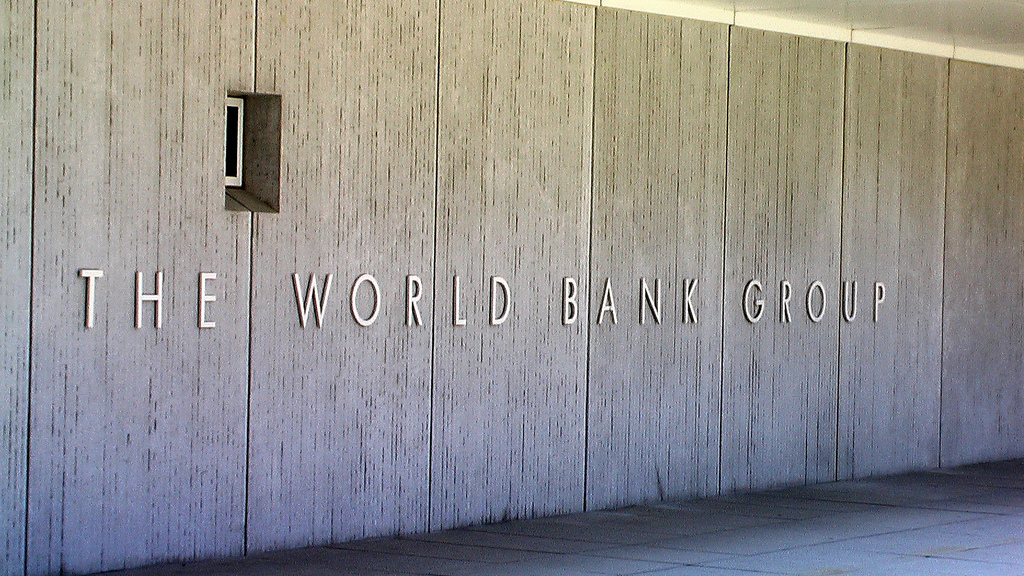is the world bank in with monsanto?

ATTN: Organizations, academics, and activists!
California-based independent Think Tank, the Oakland Institute is calling for signatories to help put pressure on the World Bank to stop promoting policies that favor (and are deeply influenced by) agri-giants like Monsanta and Syngenta in ways that may support countries in passing laws that dramatically limit small farmers' rights to save, sell, and exchange seeds. It takes no stretch of the imagination to envision the repercussions that this type of global policy might have on small food systems, the viability of small farming in developing countries, seed sovereignty in sustainable ag, and biodiversity worldwide.
The crux of the issue seems to be that a world bank index on "Enabling the Business of Agriculture," that is a ranking system that rates countries on their agricultural policies, rewards countries that give large companies (but not small farmers) access to gene banks.
The call from the Oakland Institute is pasted below, but you can check out their website for more information. If moved to help, you can send letters to the World Bank and their donors or send your (group) name and country to amartinprevel@oaklandinstitute.org by Tuesday, January 10, 2017 COB (academics signatures are also accepted) to be added to the signatories of the Oakland Institute's petition.
|
Please join us in challenging the World Bank’s takeover of farmers’ right to seeds!
Since 2013, the World Bank has been rolling out the Enabling the Business of Agriculture (EBA), an index demanded by the G8 to score countries on how they facilitate “doing business” in agriculture. The EBA is supported by five Western donors, including the Bill and Melinda Gates Foundation, and has sought the expertise of some of the largest agrochemical firms in the world (Bayer, Monsanto, Syngenta, Pioneer, Yara, among others) to determine which “regulatory burdens” hamper their business around the world.
The EBA’s top-down approach dictates so called “good practices” to regulate agriculture, and then scores countries on how well they apply these prescriptions. In the seed sector, the EBA pushes for intellectual property rights to further corporate profits. It awards the best scores to countries that ease private companies’ – but not farmers’ – access to public genebanks. The EBA recommends that governments reduce the time and cost necessary to register industrial seeds, and that the private sector be predominantly represented in the national committees that supervise the introduction of new varieties.
While the stated goal of the project is to guide policymakers to implement “smart and balanced policies,” the EBA ignores farmer-managed seed systems, which provide 80 to 90% of farmers’ seed supply in developing countries and are key to preserving agro-biodiversity and fostering resilience against climate and economic shocks.
We are deeply concerned by the repercussions that the EBA will have on farmers, consumers, and the environment. One of the countries where the EBA has begun to have its impact is Rwanda, where the Bank’s report inspired the design of a new seed ordinance. This new law opens the door for Rwanda’s adhesion to the UPOV 1991 Convention, a treaty that dramatically restricts farmers’ rights to save, exchange, and sell seeds.
In January, the World Bank will release the next EBA report, scoring the agricultural policies of over 60 countries. Please consider joining us in sending letters to the President of the World Bank, Jim Yong Kim, and the donors who are bankrolling the EBA project, to demand that the Bank stops promoting pro-corporate policies that jeopardize farmers’ right to seeds, food security, and the future of our planet.
You can add your organization to the signatories by sending your group name and country to amartinprevel@oaklandinstitute.org by Tuesday, January 10, 2017 COB (academics signatures arealso accepted).
|

